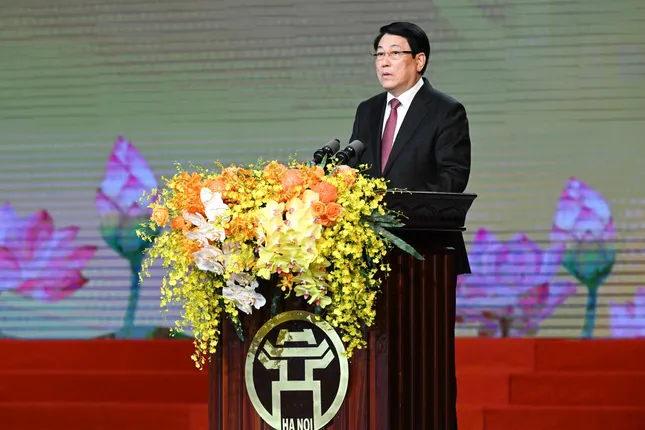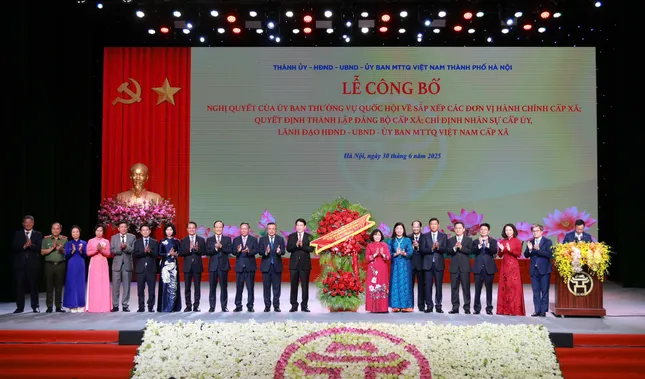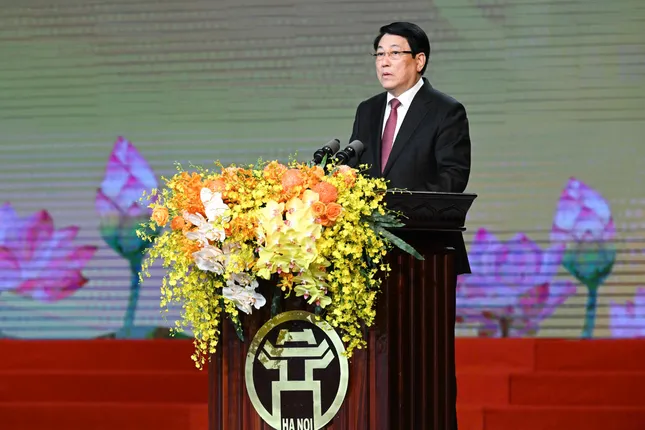On the morning of June 30, Hanoi held a ceremony to announce the National Assembly’s resolution and the city’s decision on the merger of administrative units and the establishment of new Party and Fatherland Front committees in the city’s newly formed wards and communes. The event was held at the Vietnam-Soviet Friendship Labor Culture Palace and was attended by 126 of the capital’s new wards and communes via teleconference.
Attending the event at the main venue were Mr. Luong Cuong, State President; Mr. Le Khanh Hai, Head of the Presidential Office; Mr. Hoang Dang Quang, Deputy Head of the Central Organization Commission; and Mr. Hoang Cong Thuy, Vice Chairman of the Central Committee of the Vietnam Fatherland Front.
In his speech, State President Luong Cuong expressed his emotion in attending the ceremony to announce the decisions of the Central Government and Hanoi on the rearrangement of communal-level administrative units. The President considered this a very special milestone for the capital city and the whole country, as from this day forward, there will only be 34 provinces and cities and 3,321 communes and wards nationwide.
“Starting July 1, 2025, the local government apparatus across the country will officially enter a new phase, transitioning from a three-tier system that has been in place for nearly 80 years since the country’s establishment on September 2, 1945, to a two-tier local government system,” said the President.
State President Luong Cuong emphasized that the policy of reorganizing the apparatus and administrative units is a major and extremely important policy of the Party and the State, with a long-term strategic and determined vision to build an administrative system that is streamlined, efficient, effective, and capable of better serving the people.
The State President went on to say that this event is not just a simple adjustment of administrative boundaries but also a significant step forward politically, organizationally, and for the sustainable development of the country. This is especially true for the thousand-year-old heroic and cultural Hanoi, which holds a particularly important position as the country’s political and administrative center and the heart of Vietnam.

State President Luong Cuong delivers a speech at the ceremony.
“Hanoi is also a major center for culture, education and training, science, technology, and international integration,” he added. “This administrative reorganization is of great significance for Hanoi, meeting the needs of urban development, cultural and historical preservation, administrative reform, and more efficient utilization of the capital’s resources and space.”
State President Luong Cuong also highly appreciated the Hanoi Party Committee’s serious, proactive, and creative approach to the reorganization of the administrative apparatus, reducing the number of communal-level units from 526 to 126.
According to the State President, this administrative reorganization has received the support and high appreciation of the capital’s officials, party members, and people, opening up new development space and strengthening Hanoi’s role as a driving force not only for the city but also for the Red River Delta region, the Northern Key Economic Region, and the whole country.
Based on the important policies issued by the Party and State in the past to create a legal and political framework for the two-tier local government system, the State President requested that the Hanoi Party Committee and authorities continue to concretize and effectively implement these policies. He particularly emphasized the need to follow the Central Committee’s Instruction No. 45 on the organization of party congresses at all levels towards the 14th National Party Congress, the Politburo’s resolutions on the “four-pillar” groups, the Resolution on the direction and tasks for developing Hanoi until 2030, with a vision towards 2045, and the 2024 Law on the Capital City.

State President Luong Cuong presents flowers to congratulate the Hanoi Party Committee, People’s Council, People’s Committee, and Vietnam Fatherland Front Committee.
















